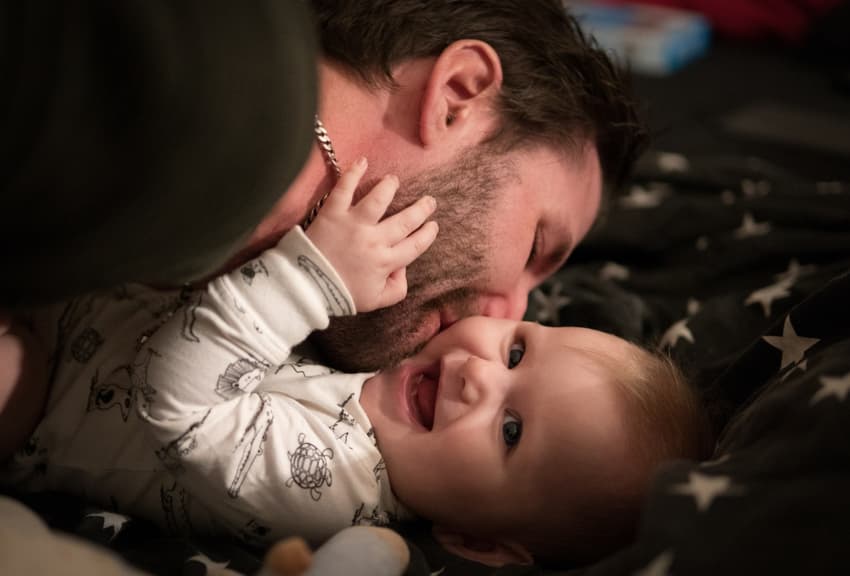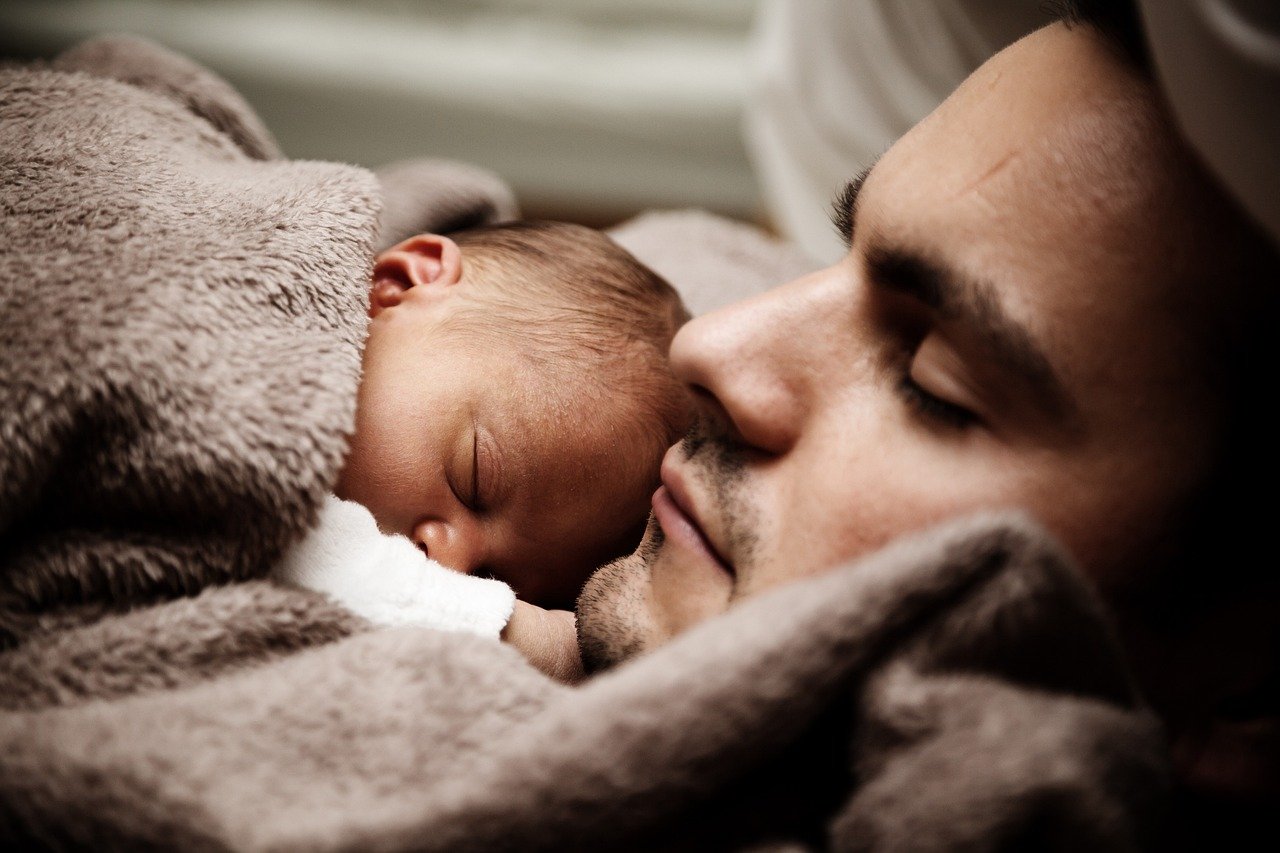Vaterschaftsurlaub: What you need to know about paternity leave in Germany

Starting in 2024, fathers in Germany - or the mother’s partner - can take paid parental leave without dipping into their vacation days or officially applying for parental leave (Elternzeit).
How much paternity leave will fathers be entitled to?
Fathers - and second parents - will be guaranteed two weeks of paid paternity leave, or Vaterschaftsurlaub.
They'll be granted the leave following the birth of the child, with it set to stretch for 10 working days.
READ ALSO: New fathers in Germany to receive paid parental leave 'starting in 2024'
According to Family Minister Lisa Paus (Greens), the leave is to be enshrined in Germany's Maternity Protection Act (Mutterschutzgesetz). The law already grants new mothers, who are also employees, six weeks of fully paid leave off before the birth of their child and two months afterwards.
Currently, it is already possible for both parents to take parental leave in Germany. Employees can even take the job-protected leave for up to three years. If both parents share it, up to 14 months can be paid.
With the 'Elterngeld Plus' model, the duration can be extended to 28 months, but then the monthly payments (normally set at 65 percent of a salary, up to €1800) will be halved.
READ ALSO: EXPLAINED: Everything you need to know about parental leave in Germany
Why did Germany decide on two weeks of paternity leave?
Well, it didn't exactly. An EU-wide regulation for countries to grant at least two weeks of fully paid paternity leave came into force in July 2022, and most other European countries have already adopted it into their legal framework.
As Germany is running behind schedule to also officially write paternity leave into law, the EU Commission has initiated infringement proceedings.

Fathers in Germany will soon receive 10 days of paid leave after the birth of their child. Photo: Pixabay
Paus explained in 2022 that the regulation had been postponed to 2024 to give companies, especially small and medium-sized ones, time to prepare amid a difficult economic climate.
Paid paternity leave is intended to strengthen the father-child relationship in the long term, said Paus.
"Especially in the first period after the birth, it is important that parents have time for each other and the baby," Family Minister Lisa Paus told the newspapers of the Funke Mediengruppe last November when announcing the new regulation.
"This is also important so that fathers can build a close relationship with the child early on," Paus added.
Do fathers and second parents have to apply for paternity leave?
Nope. No application will be required to take paternity leave.
The entitlement to paternity leave comes into effect automatically and immediately after the birth of the child. It is therefore not necessary to make a separate application, as is the case with Elternzeit.
According to the EU Directive, this entitlement applies regardless of seniority or length of employment, meaning it will also be available to fathers in their six-month long Probezeit (probation time) while having their new jobs legally protected.
Are fathers entitled to special leave after the birth?
Yes, there is a legal entitlement to at least one day of time off as well, which is anchored in section 616 of Germany's Civil Code. However, it does not specify exactly how many paid days off days can be taken, so it's usually the employer who decides.
The Allensbach Institute for Public Opinion Research has looked into this question last month. After surveying 1,200 companies, they found that 26 percent of the companies surveyed grant only one day of special leave (Sonderurlaub) for the birth of a child.
Another 26 percent grant two days, and four percent grant more than two days.
However, 44 percent of the companies do not officially grant their employees any paid special leave for the birth.
Comments
See Also
How much paternity leave will fathers be entitled to?
Fathers - and second parents - will be guaranteed two weeks of paid paternity leave, or Vaterschaftsurlaub.
They'll be granted the leave following the birth of the child, with it set to stretch for 10 working days.
READ ALSO: New fathers in Germany to receive paid parental leave 'starting in 2024'
According to Family Minister Lisa Paus (Greens), the leave is to be enshrined in Germany's Maternity Protection Act (Mutterschutzgesetz). The law already grants new mothers, who are also employees, six weeks of fully paid leave off before the birth of their child and two months afterwards.
Currently, it is already possible for both parents to take parental leave in Germany. Employees can even take the job-protected leave for up to three years. If both parents share it, up to 14 months can be paid.
With the 'Elterngeld Plus' model, the duration can be extended to 28 months, but then the monthly payments (normally set at 65 percent of a salary, up to €1800) will be halved.
READ ALSO: EXPLAINED: Everything you need to know about parental leave in Germany
Why did Germany decide on two weeks of paternity leave?
Well, it didn't exactly. An EU-wide regulation for countries to grant at least two weeks of fully paid paternity leave came into force in July 2022, and most other European countries have already adopted it into their legal framework.
As Germany is running behind schedule to also officially write paternity leave into law, the EU Commission has initiated infringement proceedings.

Paus explained in 2022 that the regulation had been postponed to 2024 to give companies, especially small and medium-sized ones, time to prepare amid a difficult economic climate.
Paid paternity leave is intended to strengthen the father-child relationship in the long term, said Paus.
"Especially in the first period after the birth, it is important that parents have time for each other and the baby," Family Minister Lisa Paus told the newspapers of the Funke Mediengruppe last November when announcing the new regulation.
"This is also important so that fathers can build a close relationship with the child early on," Paus added.
Do fathers and second parents have to apply for paternity leave?
Nope. No application will be required to take paternity leave.
The entitlement to paternity leave comes into effect automatically and immediately after the birth of the child. It is therefore not necessary to make a separate application, as is the case with Elternzeit.
According to the EU Directive, this entitlement applies regardless of seniority or length of employment, meaning it will also be available to fathers in their six-month long Probezeit (probation time) while having their new jobs legally protected.
Are fathers entitled to special leave after the birth?
Yes, there is a legal entitlement to at least one day of time off as well, which is anchored in section 616 of Germany's Civil Code. However, it does not specify exactly how many paid days off days can be taken, so it's usually the employer who decides.
The Allensbach Institute for Public Opinion Research has looked into this question last month. After surveying 1,200 companies, they found that 26 percent of the companies surveyed grant only one day of special leave (Sonderurlaub) for the birth of a child.
Another 26 percent grant two days, and four percent grant more than two days.
However, 44 percent of the companies do not officially grant their employees any paid special leave for the birth.
Join the conversation in our comments section below. Share your own views and experience and if you have a question or suggestion for our journalists then email us at [email protected].
Please keep comments civil, constructive and on topic – and make sure to read our terms of use before getting involved.
Please log in here to leave a comment.